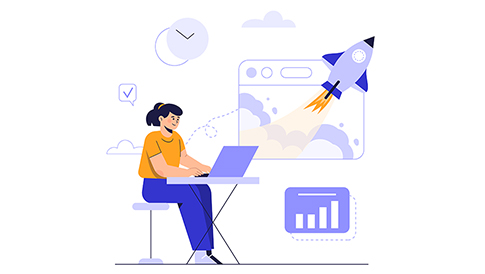How to Effectively Manage Your Stress and Anxiety Before a Job Interview
Interviews can be anxiety-provoking experiences, but there are things you can do to manage your stress and anxiety before a job interview. Remember that feeling scared, lost, and unsure of yourself while searching for a job is normal. You’re not alone and can (and will) get through this.
20 Tips for Overcoming Interview Stress and Anxiety
Congratulations on making it to the interviewing stage or the hiring process! You’ve already done so much to reach this milestone, so give yourself a pat on the back. You’ve earned it.
1. Talk to Your Reflection
Talking to a mirror can help us develop a sense of self, shift our perspectives, and make us less socially awkward. It can also make us more aware of our tone of voice, eye contact, and body language. While you may feel silly at first, this strategy decreases anxiety.
2. Research the Company
Research the company’s mission statement and values on its website or social media pages. This knowledge can help you incorporate the company’s brand into your answers. Look up the interviewer on LinkedIn. Having a face in mind will eliminate first-meeting awkwardness.
3. Let Go of Control
Lack of control is the main symptom of anxiety, but you can minimize your fears by focusing on what you can control. For example, you can practice your answers with friends or family, plan your outfit, or drive to the interview site a day before the interview date so you won’t get lost.
4. Practice Self-love
Being nervous for an interview is normal, and you can use that thought to practice self-love. You’re nervous because you want to do well. Tell yourself that these feelings make sense, and you’re doing everything possible to prepare for your interview. Be your hype person!
5. Be Your Own Friend
If you’re having difficulty practicing self-love, ask yourself how you would talk to a friend if they were scared. You’d likely tell them to believe in themselves, that they’re qualified for the job, and to keep practicing their answers. Share that love you give to your friends to yourself.
6. See the Finish Line
Anxiety can make us imagine the worst-case scenario. Acknowledge that the employer already likes you; interviews are a tool to get to know you better. There’s a good chance they’ll be your potential employer, so try to envision the finish line as one of many positive possibilities.
7. Interrupt Negativity
Negative thoughts and “what if” narratives aren’t helpful because they create a warped reality. Replace it with a positive mantra when you realize you’re thinking negatively. Instead of saying, “I can’t,” say, “I’m ready, I’m capable, and I’m going to do well in this interview.”
8. Use a Cheat Sheet
If your negative thoughts run away from you, make a positive thought cheat sheet. To make a positive cheat sheet, write down your negative thoughts and put something positive beside them. You can also write down coping mechanisms if you need more than positive affirmations.
9. Focus on a Goal
Goal-setting can help you stay motivated and inspired, especially if they’re broken down into smaller parts. Goals like “get a job” are massive and intimidating. Instead, set goals like “learn how to sit up straight” or “stop saying “um,” so you can work on your skills one step at a time.
10. Rethink Failure
There’s a possibility that you won’t get a job, and it’s okay to acknowledge that. However, even if you don’t get the job, that doesn’t mean you failed or wasted your time. Maybe you weren’t right for this job, or maybe they didn’t see your shine. Either way, you became a better interviewer.
11. Ground Yourself
Grounding exercises can place your thoughts and feelings in the present moment. When you’re feeling stressed, look at the objects around your room and name them in your head or out loud. Practice this technique before your interview, so you can use it if you feel overwhelmed.
12. Plan Your Answers
Unfortunately, your interviewer won’t tell you what questions they’ll ask. However, interviewers love to use dozens of questions, and you’ll be in a good position if you prepare these answers in advance. You can even use these answers as a guide for a phone interview.
13. Try a Prep Platform
An interview prep platform can set you up with coaches to help prepare you for roles. Instead of general advice, interview coaches will use real examples, feedback, research techniques, and even the most common product manager interview questions to ensure your answers are appropriate for your industry.
14. Dress the Part
Most office jobs have a business casual dress code, which includes a blouse and slacks for all genders. Being well-groomed and tidy is also a good idea. If you’re unsure how to dress, look up the company website or social media pages and see how employees dress themselves.
15. Know Your Value
Interviews can make us anxious because we’re worried about being judged. Remember that you’re a valuable asset to any employer because you’re skilled, experienced, or hard-working. Your interviewer is probably nervous, too, because they want to make a great first impression.
16. Clear Your Mind
Meditation can help you clear your mind, but it may be difficult if you aren’t familiar with the practice. Instead of fully meditating when you’re stressed, close your eyes and focus on your breaths. This trick is helpful directly before the interviewer, as it’ll calm you in a few minutes.
17. Build Rapport
Think of how you’ll build rapport before the interview, as maintaining eye contact and shaking a person’s hand can make you look professional. Practice walking up to your friends and family and introducing yourself to the interviewer. Mock interviews are another great way to practice.
18. Be Truly Sincere
Advice like “be yourself” is nice, but most of us fidget in our seats, stutter when we’re nervous, or look around the room, which is seen as “red flags” by interviewers. Instead, be sincere. Be honest about your accomplishments, show interest, and express gratitude in the interview.
19. Ask Questions
No interview is a one-way street. Candidates should ask questions at the end of an interview to help them understand if they want to work for the company. It also shows the interviewer that you’re really interested in the position, which reflects well on your candidacy.
20. Reach out if Needed
If you frequently feel overwhelmed before an interview and you aren’t able to manage your stress and anxiety by yourself, reach out to a friend, family member, or mental health professional. They can provide valuable support, offer coping strategies, and, if necessary, discuss the option of anxiety medications with you.




Leave a Reply